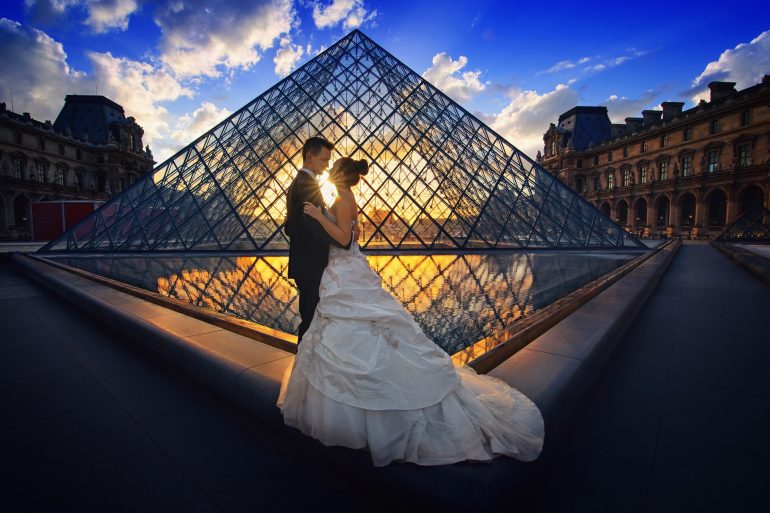Are you and your significant other passionate about cultures, travels, the past, the future, traditions and the origins of everything? Do you also want to have a wedding worthy of your cultures and traditions?
Have you thought about taking a trip through time, colors, cultures and traditions? Have you spent months choosing a traditional and cultural country to discover as a couple on your honeymoon?
Very good idea !
But why do you think the honeymoon is called ‘honeymoon’?
Is it a stay where you only come out when the moon comes out and eat nothing but honey?
Weird idea, isn’t it?
That’s why we decided to do some research and bring you this article which contains the mystery of the honeymoon, the journey of lovers!
Are you ready to solve the mystery of this romantic event?
Perfect ! so let’s start exploring!
If today the honeymoon takes the form of a trip of a fortnight to an often distant destination where we share romantic moments, complicity and well-being, without forgetting the texts of love eye to eye, you should know that it has not always been synonymous with romantic stays for the bride and groom!
The origin of the honeymoon:
Here are some ways to understand the origins of this tradition!
1- The Babylonian legend:
In Babylon, the city of ancient Mesopotamia whose foundation dates back to 2300 BC, it was a custom that the bride’s father offer his son-in-law as much beer as he wanted during the first month after the union, as a sign of an original wedding gift!
This beer was made with honey and we therefore called the first 30 days of marriage: the month of honey!
A long time ago, people referred to a lunar calendar hence the term “honeymoon” we know today!
2- Honey consumption:
Newlyweds to consume mead, which is a honey-based drink, during the first month following their wedding.
This practice comes from the Germanic population.
Hindus and Chinese consume honey directly during this period.
It is also said that the pharaohs drank a beverage made from honey and propolis during the 28 days following their union.
This drink was considered an aphrodisiac and promotes the fertility of spouses for a happy life with many children!
3- John Heywood’s proverb in 1546:
The phrase “honeymoon” comes from the English term “honeymoon”.
It is a romantic nickname that lovers give to each other.
Did you know?
The expression “honeymoon” or honeymoon in French, appears for the first time in the text of John Heywood!
- Voltaire: Zadig in 1747:
Did you know?
It was in Voltaire’s novel that the expression “honeymoon” appeared for the first time in France!
It would seem that the honeymoon is a 4000 year old tradition.
Lovers leave the hive like bees.
The goal is to harvest their own nectar themselves and feed dreams together!
Now we’re going to take you on a journey through cultures so you can uncover the mysteries of wedding nights around the world.
Here are some traditions to celebrate the wedding night.
Wedding night traditions
1- Wedding night traditions in the Middle Ages:
In the Middle Ages, it was important to announce the fateful moment in the streets of the village.
Before reuniting with her husband, the bride had to remove her clothes and her lingerie in front of her bridesmaids.
Another tradition also existed, but disappeared during the 18th century.
The sexual act was forbidden between the newlyweds during the wedding night and during the three days following their union.
It was therefore forbidden for them to speak or even look at each other during this long period!
2- The wedding night during the 19th century:
A rather funny tradition!
At that time, weddings were beginning to modernize.
During the meal, the spouses escaped to a secret place.
The mission of the guests was to find them.
Once the couple was found, the lovers had to swallow a mixture called “toast”.
This mixture is used either to delay the sexual act or to promote it.
It will depend on the taste that the guests choose.
The wedding night therefore depends on the deceit of the guests!
In bourgeois circles, the bride and groom could go on a trip as soon as the ceremony was over. They usually went to Italy or Provence for the wedding night.
This is how the different traditions came to an end as they came!
- Today’s honeymoon:
Today, the program of the wedding night depends on the wishes of the spouses.
Some decide to slip away at the end of the ceremony so as not to spoil the party, while others prefer to dance until the end of the night and leave the next day.
If you decide to leave before the end of the evening, don’t forget to warn your guests during the day so that they are not offended and do not come looking for you like the traditions of the 19th century!
4- How is the wedding night abroad?
The wedding night does not really differ abroad.
In China, for example, the bride and groom slip away immediately after the ceremony.
In Thailand, the tradition requires that the guests lead the bride and groom to their room and the parents of the bride are required to join the bride and groom’s hands as a sign of a rite of passage, only then that they can leave.
Morocco, on the wedding night, the sheets are sprinkled with rose water and orange blossom water.
And this, in order to make the room more pleasant.
There are also dates and dried fruits so that the bride and groom do not miss anything during their wedding night.
The bride and groom’s family ensures that everything is done to make the two lovebirds feel comfortable and want for nothing!





